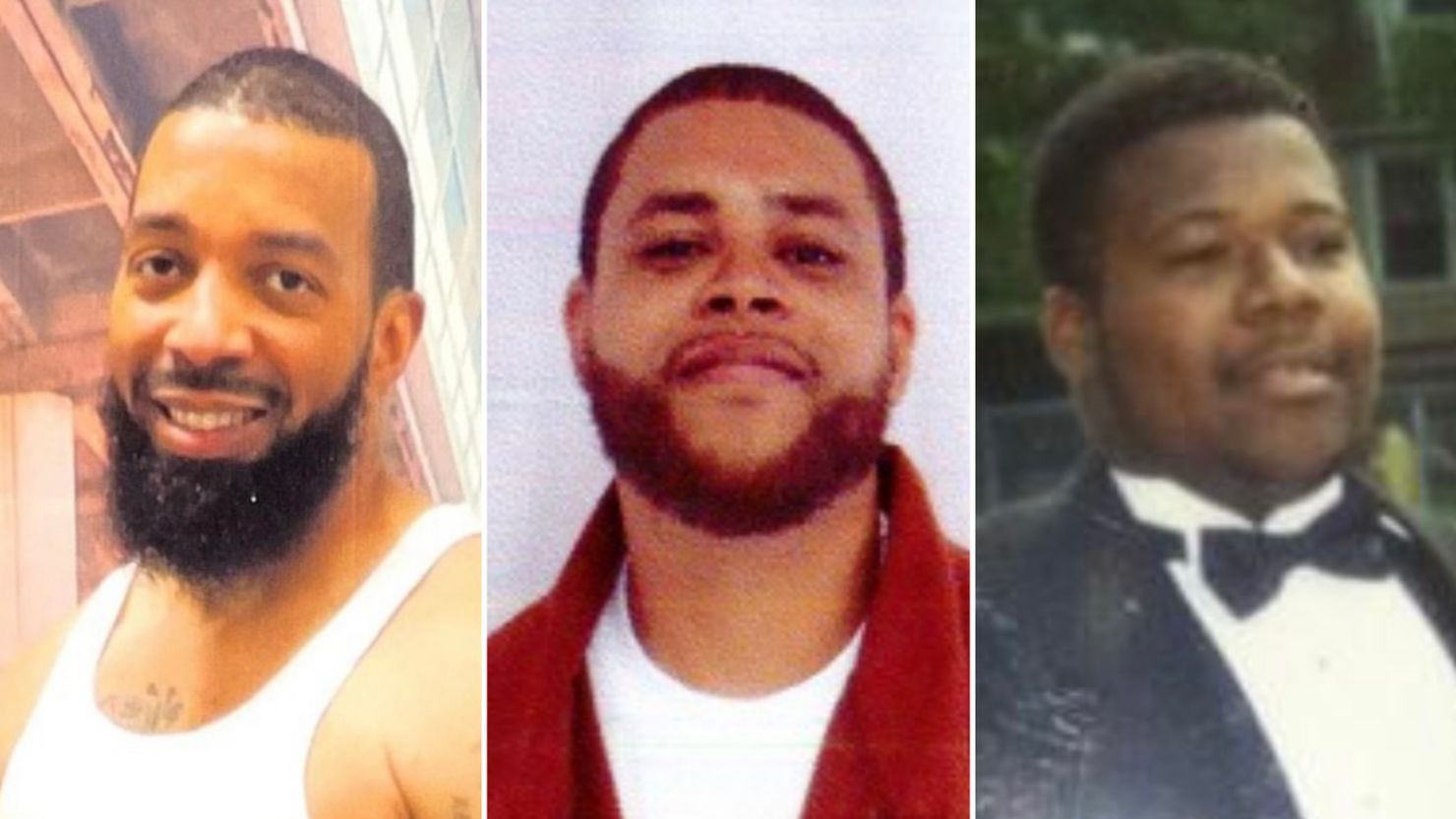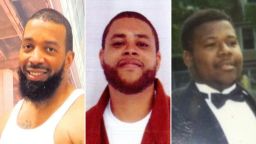Citing new DNA evidence, a Pennsylvania judge on Thursday overturned the murder convictions of three men known as the “Chester Trio” who have been imprisoned for nearly 25 years for a crime they say they did not commit.
Derrick Chappell, 41, Morton Johnson, 44, and Samuel Grasty, 47, were each convicted in separate trials of second-degree murder and other charges in 2000 and 2001, and sentenced to life in prison for the 1997 killing of Henrietta Nickens, 70, in Chester, Pennsylvania.
Yet they have maintained their innocence over the two decades they’ve been imprisoned.
Last year, the “Chester Trio” asked a judge to throw out their convictions and order new trials, citing new DNA evidence they say points to an unknown man as the killer. Prosecutors, though, fought to keep the three behind bars and uphold the convictions, saying the DNA evidence did not change anything already known at the time of their trials.
In Thursday’s ruling, Delaware County Judge Mary Alice Brennan sided with the trio, vacating the convictions and granting their request for a new trial.
The ruling is a vindication of their long protests of innocence, said Paul Casteleiro, an attorney with Centurion who represents Grasty.
“This order means so much in that it says this court believes that these guys would be acquitted, they’re innocent,” Casteleiro told CNN. “That’s powerful after all these years of knocking on the door and being denied everywhere they went.”
The ruling spurred a range of emotions from the men, their attorneys told CNN.
“As soon as (Johnson) heard, he went and found Derrick (Chappell) in the yard and brought Derrick in, and they just stood there hugging and crying,” said Vanessa Potkin of the Innocence Project, who represents Johnson. “You can imagine what an ordeal this has been for them.”
Chappell was “really excited and grateful,” said Nilam Sanghvi of the Pennsylvania Innocence Project, which represents Chappell.
“We’re really glad the judge understood the power that this new evidence would have,” Sanghvi said.
Still, Chappell, Johnson and Grasty remain behind bars. Prosecutors have up to 30 days to decide whether to appeal the judge’s ruling, and a bail hearing is set for May 23.
Delaware County District Attorney’s Office director of policy and public engagement Margie McAboy said no decision has been made yet. “The DA will be meeting with his Deputy for Law and Appeals, Cate Kiefer, next week to review next steps,” she said in an email.
Casteleiro, Grasty’s attorney, said his client was very happy but noted he’s not out yet. “Until each one of them is out and free, this isn’t over,” Casteleiro said.
The three men were represented by nonprofit organizations working to free people they believe are wrongly convicted: Johnson by the?Innocence Project, Chappell by the?Pennsylvania Innocence Project?and Grasty by?Centurion. The law firm Shook, Hardy & Bacon, also provided pro bono legal services for Chappell.
This case is just one of a number of murder convictions to be overturned years afterward. On March 18, Pennsylvania freed C.J. Rice from prison after he served more than a decade behind bars for a shooting his doctor, the father of CNN anchor Jake Tapper, said he could not have physically committed.
What the case was about
The case against Chappell, Johnson and Grasty stems from the killing of 70-year-old Henrietta Nickens, who died in her home in Chester on October 10, 1997. She had been beaten, and investigators found semen in her rectum and a mysterious green jacket with cocaine in the pocket on top of her TV.
Testing of the semen at the time showed it was from a male who remains unknown to this day, according to court filings.
The case against them primarily relied on testimony from a key witness, 15-year-old Richard McElwee, who said he acted as lookout while the other three robbed Nickens of $30, according to court records.
In exchange for his testimony, McElwee agreed to plead guilty to third-degree murder and other charges and was sentenced to six to 12 years in 1999, according to court records. CNN has not been able to reach McElwee.
The defendants’ petition for a new trial came after new DNA testing, which took place in 2021, further linked evidence from the crime scene to the unknown male and excluded the three defendants, according to Chappell’s attorneys.
Modern DNA testing techniques, particularly “touch DNA,” revealed the DNA from the semen matches several other items of crime scene evidence, including more semen on the green jacket and on the bedsheet and items in the jacket’s pocket, according to attorneys for the defendants.
Timothy Palmbach, an expert in crime scene reconstruction, testified in a Delaware County courtroom last August about the new DNA evidence, in particular a mixture of the unknown man’s semen, the victim’s blood, and urine on her bedsheet. The commingling of those bodily fluids shows the beating and sex occurred at about the same time, he testified, rebutting a key prosecution argument they were unrelated.
The mixture “fundamentally changes the nature of the crime scene and the conclusion to be drawn from it,” Palmbach said in court and wrote in a forensic report.
However, the prosecution argued their initial trials did not connect the semen to the defendants, and so these test results did not change the evidence. The prosecution also raised the possibility the 70-year-old may have had a secret sexual partner.
“The totality of the evidence – including the post-conviction DNA evidence – is just as consistent, if not more consistent, with Ms. Nickens having consensual intercourse prior to the assault as it is with an unknown perpetrator committing both a rape and an assault,” prosecutors wrote.



